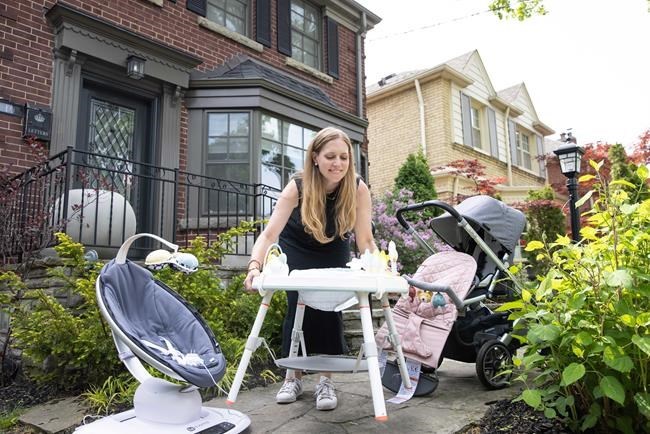Hudson's Bay Co. is wading into the booming resale marketplace through a partnership with Canadian startup Rebelstork Corp. as shoppers increasingly turn to second-hand e-commerce platforms in search of cheaper and greener goods.
The deal will give Rebelstork, a managed marketplace for the resale of overstock, open box and used baby gear, a link on the department store’s website — the sixth largest e-commerce presence in Canada.
The online promotion of the startup is also С����Ƶ paired with two in-person pilot events. The Bay is inviting customers to trade in their used baby gear at its department stores in Surrey, B.C., and Mississauga, Ont., on Saturday in exchange for store gift cards. The items will then be resold on Rebelstork’s website.
The partnership highlights the legacy retailer's efforts to join the circular economy and get a piece of the growing resale market.
It follows of string of similar announcements as brick-and-mortar retailers team up with online resellers or launch their own second-hand platforms.
For example, last year Walmart in the U.S. partnered with fashion resale marketplace ThredUp, an e-commerce company that buys and sells used clothes, shoes and accessories. Urban Outfitters recently launched Nuuly Thrift, a used fashion platform, while Levi Strauss & Co. started an online marketplace to sell second-hand jeans.
Retail experts say the thriving resale market is driven by a search for value, environmental concerns and a generational shift.
"There used to be a stigma with buying used goods, like you lost your job or had no money,” retail analyst Bruce Winder said.
“There was always a market for used vehicles, but younger consumers have turned to second-hand shopping for everything from clothing to household items," he said. "It's turned into a save-the-planet environmental play and of course a way to save money."
The partnership with Rebelstork allows the Bay to tiptoe into the resale marketplace and tap into a younger consumer, Winder said.
“They're trying to target Millennial moms,” he said. “The Bay struggles with attracting younger customers. Millennials and Gen Z generally don’t have a huge affinity with department stores.”
New parents can also be big spenders. Figures cited by Rebelstork show the average family spends as much as $14,000 on a baby’s first year.
“The children’s market is a highly lucrative and competitive space,” said Tamara Szames, Canadian retail industry adviser with The NPD Group. “With parental needs and demands changing, it has become a market open for reinvention and innovation.”
Indeed, the idea for Rebelstork came about when founder and CEO Emily Hosie was on maternity leave in 2019.
The former retail executive of TJX Canada and Saks Fifth Avenue was swindled when trying to resell a pricey baby swing her son didn’t take to.
“I was going to meet somebody in a parking lot, which is inconvenient with a newborn baby to begin with,” she said in an interview. “And then I didn't actually get all of the money that we had agreed to. It was a bad experience and from there I realized there has to be a better way.”
The new mom went about launching Rebelstork to give parents a hassle-free way to buy and resell used baby gear.
The Toronto-based startup now has 12 full-time employees with drop-off depots in Ontario and British Columbia, doorstep pick up in Toronto and Vancouver and countrywide shipping.
The online marketplace checks the quality and condition of items before listing them, using a price calculated by a proprietary algorithm. Sellers then get up to 80 per cent of the sale price.
While the discounted brand-named baby gear is a big draw for deal hunters, Hosie said it also increases the sustainability of baby gear.
“Parents want to know that their baby gear isn’t going to end up in a landfill when they're done with it,” she said. “Our partnership with the Bay is really focusing on what customers want.”
For the Bay, teaming up with Rebelstork is all about increasing sustainability and integrating the circular economy into its merchandising strategy, said Laura Janney, the retailer’s chief merchant.
“This is an important part of the next generation of business,” she said. “It's important to our consumer, it's important as Canadians.”
Given the cost of baby gear and the short period of time it’s generally used for, Janney said the Bay wants to help customers explore their options in terms of buying a used item and reselling once they no longer need it.
“We've really been building our baby gear business over the last couple of years,” she said. “It’s important for us to really think about the customer’s needs.”
The Bay and Rebelstork declined to comment on the financial details of the partnership.
Retail expert Winder said it’s possible Rebelstork could pay the Bay a commission for sending shoppers its way.
“If you get 80 per cent of the resale value when you trade in your baby equipment, that means 20 per cent goes to Rebelstork,” he said.
“It’s possible the Bay is getting a portion of that … like a finder’s fee when they send shoppers their way.”
This report by The Canadian Press was first published Sept. 23, 2021.
Brett Bundale, The Canadian Press

